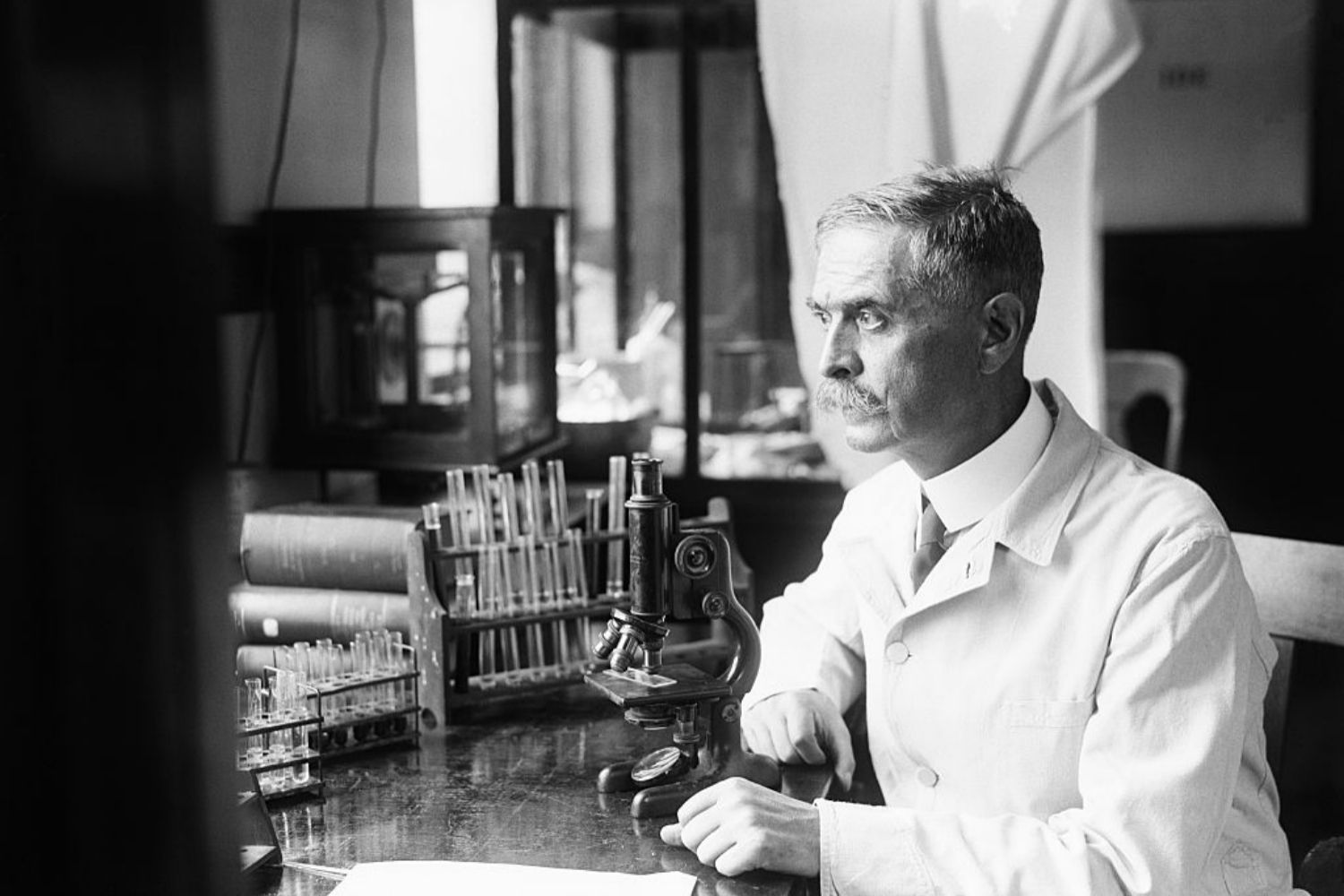
Karl Landsteiner was a remarkable scientist whose groundbreaking discoveries revolutionized the field of immunology. Born in 1868 in Vienna, Austria, Landsteiner made significant contributions to the understanding of blood groups and the development of blood transfusions.
Throughout his career, Landsteiner made several surprising and extraordinary discoveries that continue to impact the field of medicine to this day. His work not only saved countless lives, but also paved the way for advancements in organ transplants, disease diagnosis, and even forensic science.
In this article, we’ll delve into 19 unbelievable facts about Karl Landsteiner that highlight his immense contributions to the world of science and medicine. From his breakthrough discovery of blood groups to his pioneering research on diseases like polio and typhus, Landsteiner’s legacy is truly awe-inspiring. So let’s dive in and explore the fascinating life and accomplishments of this extraordinary scientist.
Key Takeaways:
- Karl Landsteiner, the “Father of Blood Groups,” revolutionized medicine with his ABO and Rh blood group systems, saving countless lives through safe blood transfusions.
- Landsteiner’s legacy lives on through World Blood Donor Day, honoring his impact on genetics and the establishment of the Landsteiner Medal for advancements in transfusion medicine and immunology.
The Father of Blood Groups
Karl Landsteiner is widely regarded as the “Father of Blood Groups” due to his pioneering work in the field of blood transfusion. His discovery of the ABO blood group system revolutionized medical practices and saved countless lives.
The ABO Blood Group System
Landsteiner’s ABO blood group system categorizes blood into four major types: A, B, AB, and O. This system enabled safe blood transfusions by understanding compatible blood types.
The Nobel Prize in Physiology or Medicine
In 1930, Karl Landsteiner was awarded the Nobel Prize in Physiology or Medicine for his discovery of the ABO blood groups. This prestigious recognition solidified his legacy in the scientific community.
The Rhesus Factor
Landsteiner also played a key role in identifying the Rhesus factor, which is a protein found on the surface of red blood cells. This discovery paved the way for the Rh blood group system.
Rh Blood Group System
The Rh blood group system classifies blood into positive or negative based on the presence of the Rhesus factor. This information is crucial in determining compatibility for blood transfusions.
Landsteiner’s Chemical Theory
Through his research, Landsteiner developed the chemical theory of blood grouping, explaining the underlying biological mechanism behind the ABO system.
Landsteiner’s Law
Landsteiner formulated a fundamental principle known as “Landsteiner’s Law,” which states that agglutination occurs when the serum of one blood type comes into contact with the red blood cells of an incompatible type.
Career in Immunology
Landsteiner dedicated his career to the field of immunology, making groundbreaking discoveries in areas such as autoimmune diseases and antibody formation.
Landsteiner’s Disease
Landsteiner made significant contributions to the understanding of paroxysmal cold hemoglobinuria, a rare autoimmune disease associated with cold temperatures.
Contributions to Typhus Research
Landsteiner conducted extensive research on typhus, a deadly infectious disease, contributing to the development of diagnostic tests and preventive measures.
Academic Excellence
Karl Landsteiner demonstrated academic brilliance from an early age, earning his medical degree with distinction from the University of Vienna in 1901.
International Recognition
Landsteiner’s groundbreaking work earned him international recognition and established him as one of the most influential scientists of his time.
Multiple Language Proficiency
In addition to his scientific achievements, Landsteiner was fluent in several languages, further enhancing his ability to collaborate and communicate with researchers from around the world.
Landsteiner and Pioneering Collaborators
Throughout his career, Landsteiner collaborated with notable scientists, including Constantin Levaditi, Erwin Popper, and Karl Wiener, further advancing the field of immunology.
Landsteiner’s Humanitarian Spirit
Karl Landsteiner’s passion for improving healthcare extended beyond his scientific endeavors. He actively promoted medical advancements for the benefit of humanity.
Landsteiner’s Legacy
Landsteiner’s discoveries continue to shape modern medicine, with the ABO and Rh blood group systems serving as the foundation for blood transfusion practices worldwide.
Tribute to Landsteiner
In honor of Landsteiner’s contributions, the international community celebrates World Blood Donor Day on his birthday, June 14th, to raise awareness about the importance of safe blood transfusions.
Landsteiner’s Impact on Genetics
Karl Landsteiner’s work laid the groundwork for advancements in human genetics, as blood type inheritance patterns became an essential component of genetic studies.
The Landsteiner Medal
In recognition of his exceptional contributions, the Landsteiner Medal was established to honor individuals who have made significant advancements in transfusion medicine and immunology.
These 19 unbelievable facts about Karl Landsteiner barely scratch the surface of his remarkable life and contributions to the field of medicine. His discoveries continue to shape our understanding of blood transfusions and immunology, ensuring safer and more effective healthcare practices for all.
Conclusion
In conclusion, Karl Landsteiner was an extraordinary individual who made tremendous contributions to the field of medicine and human understanding. His groundbreaking discovery of blood types revolutionized the field of transfusion medicine and paved the way for safer blood transfusions. Landsteiner’s meticulous research, dedication to his work, and his commitment to saving lives have left a lasting legacy.Through his discovery of the ABO blood group system and his identification of the Rh factor, Landsteiner laid the foundation for modern blood typing and compatibility testing. His work has not only saved countless lives but has also shaped the field of immunology, leading to advancements in organ transplantation, disease diagnosis, and treatment.Today, Landsteiner’s contributions continue to impact the medical field, shaping the understanding of human genetics and the importance of blood compatibility in healthcare settings. His achievements have earned him numerous accolades and recognition, solidifying his place as one of the greatest scientists in history.Overall, Karl Landsteiner’s incredible journey and his unrivaled contributions to medicine truly make him an unforgettable figure in the scientific community.
FAQs
1. Who was Karl Landsteiner?
Karl Landsteiner was an Austrian immunologist and pathologist who is best known for his discovery of the ABO blood group system, for which he was awarded the Nobel Prize in Physiology or Medicine in 1930.
2. What was Karl Landsteiner’s contribution to medicine?
Karl Landsteiner’s most significant contribution to medicine was his discovery of the ABO blood group system, which revolutionized the field of transfusion medicine and made blood transfusions much safer.
3. How did Karl Landsteiner discover the ABO blood group system?
Karl Landsteiner discovered the ABO blood group system through a series of experiments in which he mixed different blood samples and observed agglutination reactions. This led him to identify the presence of different antigens and antibodies in human blood.
4. What impact did Karl Landsteiner’s discovery have on medicine?
Karl Landsteiner’s discovery of the ABO blood group system had a profound impact on medicine. It allowed for safer blood transfusions by ensuring proper compatibility between donor and recipient blood types. It also laid the foundation for further advancements in the field of immunology.
5. What is the significance of the Rh factor?
The Rh factor, discovered by Karl Landsteiner, is an important antigen present on red blood cells. It plays a crucial role in determining the compatibility of blood transfusions and pregnancy outcomes. The Rh factor has further expanded our understanding of human genetics and immunology.
Unraveling the mysteries of blood groups and immunology has never been more fascinating. Karl Landsteiner's groundbreaking discoveries paved the way for modern medicine, but there's still so much to learn. Dive deeper into the captivating world of immunology and explore the intricacies of blood group facts. From the ABO system to the Rh factor, Landsteiner's legacy continues to inspire scientists and medical professionals alike. Embark on a journey of discovery and uncover the secrets that lie within our bodies.
Was this page helpful?
Our commitment to delivering trustworthy and engaging content is at the heart of what we do. Each fact on our site is contributed by real users like you, bringing a wealth of diverse insights and information. To ensure the highest standards of accuracy and reliability, our dedicated editors meticulously review each submission. This process guarantees that the facts we share are not only fascinating but also credible. Trust in our commitment to quality and authenticity as you explore and learn with us.


